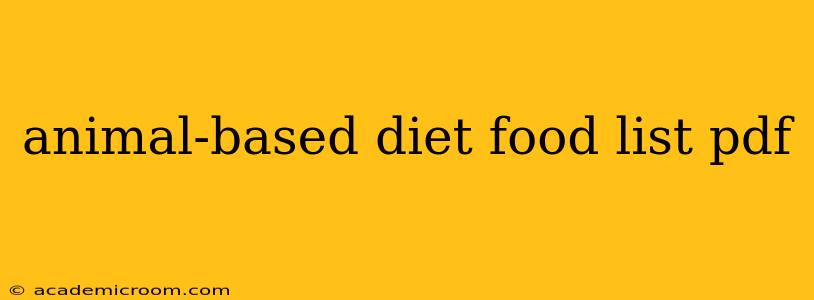An animal-based diet, also known as a carnivore diet or a zero-carb diet, focuses primarily on animal products, excluding plants entirely. While variations exist, the core principle remains the same: consuming foods derived directly from animals. This comprehensive guide provides a detailed food list, addresses frequently asked questions, and clarifies potential benefits and drawbacks. Remember, consulting a healthcare professional before making significant dietary changes is crucial, especially if you have pre-existing health conditions.
What Foods Are Included in an Animal-Based Diet?
This diet centers around a variety of animal products, offering diverse nutritional profiles. Here's a breakdown of the food groups:
1. Meat:
- Red Meat: Beef (steak, ground beef, roasts), lamb, goat, venison
- Poultry: Chicken (breast, thighs, wings), turkey, duck, goose
- Pork: Pork chops, bacon, sausage (ensure minimal added sugars/chemicals)
- Organ Meats: Liver, kidney, heart, brain (excellent sources of various micronutrients)
2. Seafood:
- Fatty Fish: Salmon, tuna, mackerel, sardines (rich in omega-3 fatty acids)
- Shellfish: Shrimp, crab, lobster, oysters (good source of protein and minerals)
- Other Fish: Cod, haddock, halibut
3. Eggs:
- Chicken Eggs: A versatile and nutrient-dense option. Consider pasture-raised eggs for optimal nutritional value.
- Other Eggs: Duck eggs, quail eggs (offer slightly different nutritional profiles)
4. Dairy (optional, depending on the variation of the animal-based diet):
- Full-Fat Dairy: Cheese (cheddar, mozzarella, etc.), butter, cream, whole milk, yogurt (consider grass-fed options)
Frequently Asked Questions (FAQs) about Animal-Based Diets
This section addresses common queries about the animal-based dietary approach.
What are the benefits of an animal-based diet?
Proponents suggest various potential benefits, including improved blood sugar control, weight loss, reduced inflammation, and enhanced gut health. However, scientific evidence supporting these claims is still limited and ongoing research is needed. Individual results may vary significantly.
Are there any potential downsides or risks?
Potential risks include nutrient deficiencies if not carefully planned (e.g., vitamin C, fiber), increased risk of heart disease if relying heavily on saturated fats from certain meats, and potential for elevated cholesterol levels. Careful monitoring and diversification within the diet, along with consultation with a healthcare professional, are crucial to mitigate these risks.
Can I eat bone broth on an animal-based diet?
Yes, bone broth is generally considered acceptable on an animal-based diet, providing additional nutrients such as minerals.
What about salt and spices?
Salt and spices are generally permissible on an animal-based diet; however, excessive salt intake should be avoided. Opt for natural spices and herbs rather than processed spice blends.
Is an animal-based diet sustainable long-term?
The long-term sustainability of any diet depends on individual preferences, lifestyle, and adherence. Some individuals find it easy to maintain, while others may find it restrictive or challenging. Careful planning and a balanced approach are crucial for long-term success.
Conclusion: A Personalized Approach
An animal-based diet offers a different approach to nutrition, with potential benefits and drawbacks. It’s crucial to understand your body's needs, consult a healthcare professional or registered dietitian, and approach this diet with careful planning and monitoring. Remember, this information is for educational purposes and does not constitute medical advice. Always prioritize your individual health needs and seek guidance from qualified professionals. This food list is a starting point – the specifics of your diet should be tailored to your individual requirements and preferences.
